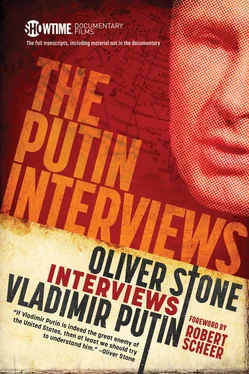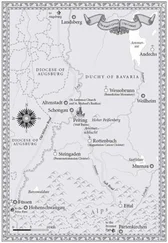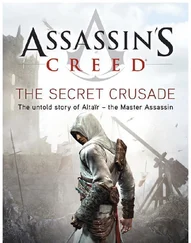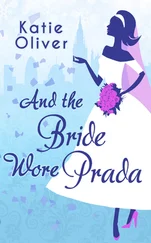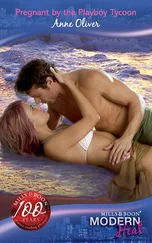Now facing his fourth American president, and ironically one he is widely accused of having helped elect (which he denies), Putin seems worn down by the effort to break through to any American leadership. He asserts that it, and more importantly the bureaucracy that informs it, inevitably views Russia not as a partner, a word he uses frequently to refer to the United States, albeit with a lacing of sarcasm, but as a convenient scapegoat for its own failures.
At the third interview’s conclusion, Putin asks Stone if he has ever been beaten. Stone assures him, “Oh, yes many times,” to which Putin responds, referring to the projected release of the documentary: “Then it’s not going to be anything new, because you’re going to suffer for what you are about to do.”
It is a painful but perhaps accurate prediction, given the current climate of widespread condemnation of yet unproven claims of Russian interference in the US election. Stone replies: “I know, but it’s worth it… to try to bring some more peace and consciousness to the world.”
—Robert Scheer
Trip 1—Day 1—July 2, 2015
ON PUTIN’S BACKGROUND
OS:I think a lot of Western people don’t know much about you except for the news. We’d like to know about your background and where you came from. I know that you were born in October, 1952, after the war. That your mother was a factory worker and your father had been in the war. But I don’t know what he did after the war. And I know that you lived in a collective apartment with other families as you grew up.
VP:My mother didn’t work at a factory. She was a worker, however, but she did different jobs. But I was an only child. They had lost two children before me. One during the Siege of Leningrad, [1] Background Information: The Siege of Leningrad (now St. Petersburg) lasted for 872 days from Sept. 8, 1941 to Jan. 27, 1944. During the Siege, the Nazis were able to encircle Leningrad and cut off nearly all of the supplies, including food, to the city. In 1942 alone, 650,000 city residents died as a result. https://www.britannica.com/event/Siege-of-Leningrad
during the war. And they didn’t want to give me up to an orphanage. And that’s why my mother was working as a warden—
OS:Because she did not want to give you up?
VP:Yes, that’s correct. And my father was working at a plant—a factory.
OS:Doing what exactly?
VP:He was an engineer. He graduated from college. He had a vocational education and he was working in a factory.
OS:Steadily or was it stop-gap work? Did he work on a steady basis?
VP:Yes. Yes. On a steady basis. I would say. And he’d been working for a very long time. And then he retired and he still worked until he was 70 or so.
OS:He was wounded in the war, though?
VP:Yes, he was. When the war started he was serving in a special unit. There were small intelligence groups which were sent to the area guard of the enemy to perform different actions. There were 20 people sent in such a group and only four survived.
He told me of that and later, when I was president, I got the archives and I received a confirmation of what had happened. It’s quite curious. It was. And then he was sent to the armed forces to one of the most dangerous areas of the Leningrad front. It was called the Nevsky Pyatachok—the bridgehead. There were hostilities on the Ritneva River. The Soviet army managed to create a small bridgehead two by four kilometers.
OS:Going on, your older brother died within a few days, I believe it was, or within a few months of your birth?
VP:No, he died during the Siege of Leningrad. And he was less than three years old. And back then in order to save children, children were taken from their families to support them, to save their lives. But my brother got ill and he died. And our parents were not even informed where he was buried. Quite curious, just recently there were some interested people and they managed to find something in the archives. They used the surname, the father’s name, and the address from whence the child was taken. And they managed to find some documents about his death and about where he was buried and the orphanage where he was sent. And last year was the first time that I visited his burial place. It’s in Memorial Soundry in St. Petersburg.
OS:Well, considering the casualties from World War II, I would imagine your father and mother were not broken by these tragedies. They must have looked to their third son as a new hope.
VP:Well, indeed they were not broken. But the war ended in 1945, and I was born only in 1952. And that was a very difficult time for ordinary people who believed in the Soviet Union. And yet they decided to have another child.
OS:And tell me… I hear you had a bit of… a bit of a juvenile delinquency problem. You were a bit of a wild child until, I heard, you studied Judo at the age of 12.
VP:Yes, indeed. My parents tried to pay attention to my upbringing but still… I lived in freedom and I spent much time in the courtyard and the streets. And certainly I was not always as disciplined as some would have liked me to be. And since I started going into sport on a systemic basis, started to do Judo, this became a changing factor in my life for the better.
OS:I also heard that your grandfather on your mother’s side was a chef at times for Lenin and for Stalin.
VP:Yes, indeed. It happened. It’s a small world as it were. It’s true. Before the 1917 revolution he worked at a restaurant in Petrograd, in Leningrad. He was a chef, a cook. I don’t know how he got to work for someone of Lenin’s stature. But later, indeed, he worked in the countryside where Stalin lived and he worked for Stalin. He was a very simple man—a cook.
OS:Did you hear him tell any stories?
VP:No, he didn’t. He didn’t tell me anything, but to be honest, part of my childhood I spent in the Moscow Oblest. We lived in St. Petersburg, which was called Leningrad back then. But in the summer we went for a few weeks to visit my grandfather—he was a retiree. But he still lived where he used to work. He lived in one of the State dachas. And my father told me how he went to his father when Stalin was still alive. And my grandfather showed him Stalin from afar. That’s the only thing I know.
OS:We have something in common—my mother who’s French, her father—my grandfather—was a French soldier in World War I. He was a chef also in the trenches. And he told me many stories about World War I and how tough it was.
VP:Yes, my mother told me also about the first World War, from what had been told to her by her father. He also participated in the first World War. One curious story from the human side. It was a war in trenches. And my grandfather got back and he told one story. He saw that one of the Austrian soldiers—I believe that was the Southern front—was aiming at him. But my grandfather was first, he shot first and the Austrian fell. And then my grandfather saw that the Austrian was still alive. But his disposition was like that—he was the only person there apart from the Austrian—and the Austrian was bleeding to death. He was going to die. And my grandfather just crawled to him. He took his first aid kit and bandaged his wounds. Quite curious. He told his relatives, “I wouldn’t have shot first if I hadn’t seen that he was aiming at me.” But whatever country you are from—we are all the same, we are all human beings and those people are also just ordinary people, just workers as we are.
Читать дальше
